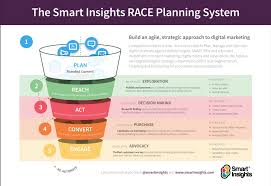Digital marketing is an essential tool for any business looking to reach a wider audience and increase their sales. A successful digital marketing strategy can help a business stand out from the competition, engage potential customers, and build a loyal customer base. Here are some tips to help you create an effective digital marketing strategy.
1. Define Your Goals: Before you begin any digital marketing campaign, it’s important to define your goals. What do you want to achieve? Are you looking to increase brand awareness or generate more leads? Knowing your goals will help you determine which channels and tactics are best suited for your business.
2. Research Your Audience: Once you have identified your goals, it’s time to research your target audience. Who are they? What do they like? Where do they spend their time online? Understanding your target audience will help you craft content that resonates with them and create campaigns that have the best chance of success.
3. Choose Your Channels: With the right research in hand, it’s time to decide which channels will be most effective for reaching your target audience. Popular choices include social media platforms like Facebook, Instagram, Twitter, LinkedIn, YouTube and Snapchat; search engines like Google; and email marketing campaigns. Consider the unique advantages of each channel when making your decision.
4. Set a Budget: Once you have chosen the channels that best suit your needs, it’s time to set a budget for each one. Allocate resources based on how likely each channel is to bring in leads or sales, as well as how much effort is required to maintain each channel (e.g., creating content). Make sure to factor in costs such as advertising fees or software subscriptions when setting up a budget for each channel.
5. Monitor Results: Finally, once you have launched your digital marketing campaign, it’s important to monitor its progress over time so that you can adjust and optimize as needed in order to maximize results and ROI (return on investment). Track key metrics such as website visits, conversions (leads or sales), engagement rates on social media posts and click-through rates on emails so that you can make informed decisions about what works and what doesn’t work for your business.
By following these steps, businesses can create an effective digital marketing strategy that will help them reach their goals faster than ever before!
What are the 4 most common questions about digital marketing strategy?
- What are the 4 types of digital marketing?
- What are the strategies in digital marketing?
- What are the 5 D’s of digital marketing?
- What are the 7 P’s of digital marketing?
What are the 4 types of digital marketing?
- Search engine optimization (SEO)
- Content marketing
- Social media marketing
- Pay-per-click advertising (PPC)
What are the strategies in digital marketing?
- Search Engine Optimization (SEO): SEO is the process of optimizing web pages, content, and other elements to make them more visible in search engine results.
- Content Marketing: Content marketing is the process of creating and distributing valuable content to attract and retain customers. It includes creating blog posts, videos, podcasts, eBooks, infographics, and other forms of content to engage with your target audience.
- Social Media Marketing: Social media marketing involves using social networks such as Facebook, Twitter, Instagram and LinkedIn to promote products and services. It also involves engaging with followers through comments, likes and shares.
- Pay-Per-Click Advertising (PPC): PPC advertising is a form of online advertising in which advertisers pay each time a user clicks on their ad. It’s a great way to reach potential customers who are actively searching for products or services related to your business.
- Email Marketing: Email marketing is the process of sending promotional emails to potential customers or existing customers in order to encourage them to purchase products or services from your business.
- Affiliate Marketing: Affiliate marketing is a type of performance-based marketing in which a business rewards one or more affiliates for each visitor or customer brought by the affiliate’s own marketing efforts.
- Online PR: Online PR involves using press releases, blog posts and other forms of content to create awareness about your brand or product among online audiences.
- Mobile Advertising: Mobile advertising is a form of digital advertising that targets mobile users with ads that appear on their mobile devices such as smartphones and tablets
What are the 5 D’s of digital marketing?
- Design: Developing creative visuals and content that engage customers.
- Develop: Building a website, app, or other digital platform to reach customers.
- Deliver: Reaching customers through digital channels such as email, social media, and search engines.
- Decide: Analyzing customer data to make informed decisions on how to improve the customer experience.
- Disseminate: Sharing content across multiple channels to reach a wider audience and build brand awareness.
What are the 7 P’s of digital marketing?
- Planning: Establishing objectives, identifying target audiences, and setting budgets for digital marketing campaigns.
- Promotion: Utilizing various forms of digital media to reach target audiences.
- Platforms: Selecting the right platforms (e.g., websites, social media channels) to reach target audiences.
- Personalization: Customizing content to meet the specific needs of individual customers or groups of customers.
- Performance Measurement: Tracking and analyzing data on campaign performance to inform future decisions and optimize campaigns in real-time.
- Productivity: Leveraging automation and other tools to maximize efficiency and reduce costs in digital marketing activities.
- Privacy: Ensuring customer data is collected, stored, used, and shared responsibly and ethically in accordance with privacy laws and regulations.




